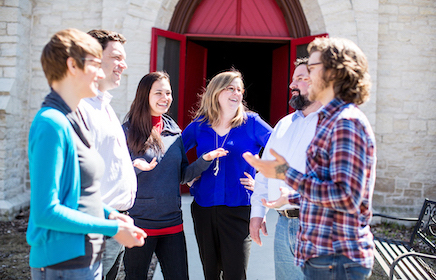
BI 501 | Biblical Studies
This class is an introduction to the interpretation of Holy Scripture that lays the foundation for future biblical study and ministries of teaching and preaching in the Church. It has four interlocking topics: the doctrine of Scripture, the theory of hermeneutics, the unity of the Bible, and the practice of exegesis. Students learn to evaluate the biblical interpretations of others and to perform faithful exegesis for themselves and those whom they serve.
OT 501 | Biblical Studies
This course introduces students to the world of Biblical Hebrew, which is the primary language of the Old Testament. Elementary grammar concentrating on the alphabet, vowels, nouns and the verb system is emphasized, but attention is also given both to the history of the Hebrew language and to English grammar. Students will be able to engage basic Hebrew texts with the assistance of linguistic aids such as a Hebrew lexicon.
OT 502 | Biblical Studies
This class is a continuation of Hebrew 1 in a seminar format. It is designed to help students apply their foundational knowledge of grammar to the systematic reading and translation of Hebrew texts. The course begins with instruction on the derived stems and weak roots and then moves on to reading biblical texts. Through in-class practice, students develop their skills in vocabulary recognition, verb parsing, and syntactical decipherment. Over the course of the term, they are exposed to all of the major genres and sections of the Hebrew Bible.
OT 511 | Biblical Studies
Old Testament 1 is the first part of a two-term sequence that introduces students to the Old Testament as Christian Scripture for the ministry and mission of the Church today. The course covers the Pentateuch and historical books and focuses on interpreting narrative and legal literature. Students will learn the historical background, literary shape, and theological message of each biblical book. At the end of the course, students should have a new appreciation for the Old Testament as the indispensable beginning of the salvation story that culminates with Jesus Christ.
OT 511H | Biblical Studies
This course is designed to introduce students to the ongoing vitality of the Old Testament for the ministry and mission of the church. After addressing key interpretive issues, the course surveys the contents of the Old Testament with a focus on the historical context, literary shape, and theological and ethical challenge of each book. At the end of the course, students should have a new appreciation for the Old Testament as an integrated whole, and for its potential as a resource for the Christian journey. This is the first of a two-part ‘complex’ (OT511-512) that introduces students to the Old Testament.
OT 512 | Biblical Studies
This course is a continuation of Old Testament 1 that covers the second half of the Old Testament, Job through Malachi. It focuses particularly on interpreting the poetic, wisdom, prophetic, and apocalyptic genres of the Old Testament, but it also provides an overview of canon formation and the contents of the Apocrypha. The class introduces students to the historical, cultural, literary, and theological dimensions of these books for the purpose of teaching and preaching them as Holy Scripture for the Church today.
OT 512D | Biblical Studies
This course is designed to introduce students to the ongoing vitality of the Old Testament for the ministry and mission of the church. After addressing key interpretive issues, the course surveys the contents of the Old Testament with a focus on the historical context, literary shape, and theological and ethical challenge of each book. At the end of the course, students should have a new appreciation for the Old Testament as an integrated whole, and for its potential as a resource for the Christian journey. This is the first of a two-part ‘complex’ (OT511-512) that introduces students to the Old Testament.
NT 501 | Biblical Studies
Greek 1 is an introduction to the rudiments of the Koiné Greek of the New Testament. Although significant vocabulary and a variety of morphological forms will be learned, the emphasis on this course will be on how the Greek language works, so that students will have proficiency analyzing the Greek text of the NT with the help of lexical and grammatical data that are easily accessed by a Bible software program.
NT 502 | Biblical Studies
Greek 2 completes the introduction to the rudiments of the Koiné Greek which was begun in Greek 1. In addition to reviewing all that was learned in Greek 1, aspects of vocabulary and morphology left aside in Greek 1 will be introduced and learned. The student completing this course should be able to translate easy to moderate passages of the Greek New Testament (e.g., Johannine writings, Mark, Matthew, some passages in Paul) when supplied with vocabulary occurring fewer than 30 times. Greek 1 or its equivalent is a prerequisite for Greek 2.
NT 511, NT 511H | Biblical Studies
The first course in the writings of the New Testament surveys the historical, religious, and social world of the New Testament, and introduces various critical and literary-theological methods for the study of the New Testament in general. The Gospels are then surveyed in terms of content, literary structure, critical issues, and theological emphasis. The underlying aim is to gain an understanding of the four unique portraits of Jesus provided in the canonical Gospels. The course also examines the development of the Christology of the New Testament and the modern debates about and constructs of a Historical Jesus as opposed to the Real Jesus of the four canonical portraits.
NT 512, NT 512D | Biblical Studies
Beginning with the Acts of the Apostles, each of the non-Gospel writings of the New Testament is introduced and surveyed in terms of content, literary structure, critical issues, and theological emphases. The course also examines the life, theology, and soteriology of Paul, and the development of the kerygma, incipient creedal formulae, ministry, and sacraments in the New Testament.
NT 732, AT 832 | Biblical Studies
This course explores the contested space between the good work of salvation begun and its completion “until the day of Christ Jesus” (Philippians 1:6), particularly as described in the letters of St. Paul. We will consider whether this space is best described under the term of convenience, “sanctification,” while interrogating that and other Pauline metaphors for their depiction of the “present tense” of salvation. This is then a course in Pauline anthropology, soteriology, and “ethics,” attending, among other things, to the disputed definitions of “justification” and “salvation,” participation in Christ, the meaning and work of “grace,” the place of “works” in salvation, the function of “law,” and the ministry of the Holy Spirit in Christian transformation.
CH 501, CH 501H | Church History & Historical Theology
This is an introductory survey course in church history covering important events, figures, movements, and religious, social, and intellectual developments of the patristic and medieval periods. It is normally the first course in church history taken by students in Residential and Hybrid-Distance degree programs.
CH 502, CH 502D | Church History & Historical Theology
This is an introductory survey course in church history covering important events, figures, movements, and religious, social, and intellectual developments in the reformation and modern periods. It is normally the second course in church history taken by students in Residential and Hybrid-Distance degree programs.
CH 601 | Church History & Historical Theology
This is an intermediate course in Anglican Church history covering important events, figures, movements, and religious, social, and intellectual developments from the time of the English Reformation through the development of the global Anglican Communion to the present day. It is normally the third course in church history taken by students in Residential and HybridDistance degree programs. It presupposes prerequisite work (CH 501 – CH 502 or CH 501H-CH 502D) or basic competence in the subject area.
HT 501, HT 501H | Church History & Historical Theology
This, the first of two courses in historical theology, examines theology from the second through the twelfth centuries seeking to understand how certain figures, movements, and controversies have helped to shape the development of Christian theology. Special attention will be given to key Patristic theological works and to the Ecumenical Councils of the Church.
HT 502, HT 502D | Church History & Historical Theology
This, the second course in historical theology, examines theology from the thirteenth through the twentieth centuries seeking to understand how certain figures, movements, and controversies have helped to shape the development of Christian theology in general, and Anglican theology in particular. Special attention is given to key works of Anglican theology.
MT 501 | Moral Theology & Systematic Theology
This course provides an introduction to the foundations of a contemporary Anglican approach to Moral Theology, or “Christian Ethics.” Primary attention is given to an exploration of basic Christian moral principles, and the course includes reflection upon the scope and purpose of moral theology, the importance for moral theology of the basic structure of Christian Doctrine, and the consequences for moral theology of various alternatives in theoretical or philosophical ethics. The course concludes with two short units, one on the use of Scripture in ethics, the other on moral principles and public policy that prepare students to approach specific issues in ethics during their second course in Ethics and Moral Theology (MT 601).
MT 503 | Moral Theology & Systematic Theology
This course provides an introduction to the foundations of a contemporary Anglican approach to Moral Theology, or “Christian Ethics.” Primary attention is given to an exploration of basic Christian moral principles, and the course includes reflection upon the scope and purpose of moral theology, the importance for moral theology of the basic structure of Christian Doctrine, and the consequences for moral theology of various alternatives in theoretical or philosophical ethics. The course concludes with two short units, one on the use of Scripture in ethics, the other on moral principles and public policy that prepare students to approach specific issues in ethics during their second course in Ethics and Moral Theology (MT 601).
MT 601 | Moral Theology & Systematic Theology
In this course, students take the basic principles of Christian moral theology acquired in MT 501 and apply them to five main groups of issues in contemporary ethics. The historical treatment of various issues in the Christian and wider ethical tradition provides a backdrop for the class’s consideration of moral questions, and specific reference is made to General Convention resolutions and other ecclesiastical documents.
ST 501, ST 501H | Moral Theology & Systematic Theology
The first in a two-course sequence of Christian doctrine from the Anglican perspective covering divine revelation, Scripture, Tradition, Reason, Faith, Creation, Original Sin, the Trinity, Christology, and Pneumatology. This course will examine the major Christian doctrines from their biblical foundations through their historical developments to their modern expressions. Particular attention will be given to how Anglicans have understood and received these doctrines and their importance in the life of the Church.
ST 502, ST 502D | Moral Theology & Systematic Theology
The second in a two-course sequence of Christian doctrine from the Anglican perspective covering Soteriology, Anthropology, Ecclesiology, the Sacraments, and the Last Things. This course will examine the major Christian doctrines from their biblical foundations through their historical developments to their modern expressions. Particular attention will be given to how Anglicans have understood and received these doctrines and their importance in the life of the Church.
AT 501, AT 501H | Ascetical Theology
AT 501 is the first of two courses that together provide a comprehensive introduction to ascetical theology including an overview of the general literature of Christian spirituality and its historical development. AT 501 concerns the individual’s spiritual life and surveys the spiritual literature of the first fourteen Christian centuries. The course has a dual focus on the academic basis of the Church’s spiritual tradition and the student’s experiential appropriation of that tradition, and so the course contains elements meant not only to foster in participants an intellectus fidei (a faithful understanding), but also to assist in developing a habitus fidei (a faithful character) that is embodied in a personalized praxis fidei (a faithful practice).
AT 601, AT 601D | Ascetical Theology
AT 601 is the second of two courses that together provide a comprehensive introduction to ascetical theology including an overview of the general literature of Christian spirituality and its historical development. AT 601 completes the survey of the history and literature of Christian spirituality begun in AT 501, with a focus on the Reformation and Caroline Divines, the 19th century Anglo-Catholic reclamation of the richness of the Church’s spiritual tradition, and the 20th century Anglican spiritual synthesis. In addition, AT 601 emphasizes the spirituality of the ordained person and his/her special responsibilities for assisting in the spiritual development of others. Consequently, AT 601 contains both academic and experiential elements meant not only to foster in participants an intellectus fidei (a faithful understanding), but also to assist in developing a habitus fidei (a faithful character) that is embodied in a personalized praxis fidei (a faithful practice) of ministry to others.
CM 501, CM 501H | Church Music
This course explores the history of Christian church music and introduces basic musical skills necessary for liturgical officiating. Each student is expected to become proficient in reading music, chanting, pointing collects and lessons, and an appropriate level of keyboard ability. The development of liturgical music from the early church to the present provides the framework for examining plainsong, Anglican chant, psalmody, and hymnody. Liturgical and musical terms are learned in their historical context.
LT 501, LT 501D | Liturgics
This course focuses both on the history of Christian liturgy and also the nature of liturgy itself. The course begins with an examination of the character of cult and liturgy, its construction, along with its use of language, symbol, space, and human bodies. The major focus is on the development of eucharistic liturgies, beginning with Scripture and then moving chronologically through the 20th century liturgical movement and the corresponding revisions, culminating in the 1979 American prayer book. Special attention is given to the history of English and American prayer book tradition. In addition, the development of Christian initiation rites, the liturgical year, daily prayer, and liturgical space are examined.
LT 530A, LT 530B, LT 531A, LT 531B, LT 532A, LT 532B | Liturgics
Praxis fidei, or faithful practice, is a core component of the professional training offered by Nashotah House. While the discipline of faithfully attending and authentically participating daily worship is a matter of a student’s spiritual life, their formation as competent leaders in worship through practical service on the chapel rota and frequent and attentive attendance at chapel worship is an essential part of the liturgical formation of the M.Div. program. This course serves as a practicum for the core courses in Church Music and Liturgy. This sequence of courses is divided over the term of a student’s residence at Nashotah House, valued at .5 credits in each Fall and Spring Term.
LT 601, LT 601D | Liturgics
The goal of this course is to prepare those intending to serve as priests in the Anglican tradition in all aspects of liturgical priestcraft. Focus is given to the principles that undergird Western ceremonial and how that has been applied to Anglican liturgies, along with vestments, the furnishings of a church, the liturgical calendar, and lectionaries. Considerable attention is given to the celebration of the Mass in all its possible varieties (sung and spoken, ad orientem and versus populum, traditional and contemporary language), as well as Christian initiation (baptism and confirmation), Holy Matrimony, Christian Burial, and the special liturgies of the liturgical year.
LT 803 | Liturgics
This course is for Advanced Degree students and combines a study of ritual theory, liturgical theology, and the history of Christian worship with practical engagement with the main rites of the 1979 Book of Common Prayer (and the 2019 ACNA BCP). In the time leading up to the on-campus weeks, students will focus on theology and history. The intensive week on campus, contrast, will provide hands-on training in practical liturgics, but with focus given to the principles that undergird Western ceremonial and how that has been applied to Anglican liturgies, along with vestments, the furnishings of a church, the liturgical calendar, and lectionaries. Considerable attention is given to the celebration of the Eucharist in all its possible varieties (sung and spoken, ad orientem and versus populum, traditional and contemporary language), as well as Christian initiation (baptism and confirmation), Holy Matrimony, Christian Burial, and the special liturgies of the liturgical year.
HM 501, HM 501H | Practical Theology & Christian Leadership
An introduction to the craft of sermon preparation and delivery. The significance of preaching, the importance of exegetical research, and the value of image, story, and metaphor in proclaiming the Gospel are emphasized. Students do a number of practical exercises to develop the different skills necessary for good preaching.
HM 601 | Practical Theology & Christian Leadership
An intensive laboratory experience in the preparation and delivery of sermons. Students are encouraged to develop their preaching skills in a variety of different homiletical formats and liturgical contexts.
PM 501 | Practical Theology & Christian Leadership
This course, and its companion, PM 502, provides a foundation in practical areas of parish ministry in the Anglican context with focus on the following areas of ministry: Personal Leadership (priestly identity, character, leading with one’s strengths, selforganization, emotional maturity, and family systems); Pastoral Counseling (including the issues of abuse, divorce, addiction, suicide, gender dysphoria, and mandated reporting); Polity and Canon Law (including the structure of the Episcopal Church and the Anglican Communion).
PM 501H | Practical Theology & Christian Leadership
This course, and its companion, PM 502, provides a foundation in practical areas of parish ministry in the Anglican context with focus on the following areas of ministry: Leadership and Administration (self-organization, emotional maturity, team dynamics, managing volunteers, raising up leaders, vestry leadership, finances, and stewardship); Polity and Canon Law (including the structure of the Episcopal Church and the Anglican Communion); and Catechesis (particularly in preparation for baptism, confirmation, and marriage, with special attention to the post-modern context).
PM 502 | Practical Theology & Christian Leadership
This course, together with its companion, PM 501, provides a foundation in practical areas of parish ministry in the Anglican context with focus on the following areas of ministry: Catechesis (including the formation of children, preparation for baptism, confirmation, and marriage, with special attention to the postmodern context); the sacramental and liturgical aspects of Pastoral Care (including ministry at birth, ministry to the sick, exorcism and deliverance, ministration at death, and funerals); Leadership and Administration (including team dynamics, vestry leadership, and stewardship and finances); Building a Community; Evangelism in the parish context; and Outreach.
PM 502D | Practical Theology & Christian Leadership
This course, together with its companion, PM 501, provides a foundation in practical areas of parish ministry in the Anglican context with focus on the following areas of ministry: Pastoral Care, both as it relates to pastoral counseling (including the issues of abuse, divorce, addiction, suicide) Pastoral Liturgies (ministry at birth, ministry to the sick, exorcism and deliverance, ministration at death, and funerals); Building a Community; Evangelism in the parish context; and Outreach.
PM 510D | Practical Theology & Christian Leadership
This required component of the Master of Pastoral Ministry program consists of two sessions of mentored ministry, usually in a parish, under the supervision of a seminary-approved priest/mentor. All such placements are made in consultation with and with the approval of the Director of Field Education.
PM 510, PM 511 | Practical Theology & Christian Leadership
This required component of the Master of Divinity program consists of two terms of mentored ministry, usually in a parish, under the supervision of a seminary-approved priest/mentor. All such placements are made in consultation with and with the approval of the Director of Field Education. Parish-based Field Education does not earn academic credit.
PM 609, PM 611 | Practical Theology & Christian Leadership
Summer Practicum. Clinical Pastoral Education is a form of theological education taking place in both academic classrooms and in clinical settings where ministry is being practiced. The textbooks for CPE include in-depth study of “the living human documents.” By “living human documents,” we mean both the people who receive care as well as a study of ourselves, the givers of care. Through the practice of ministry and the reflection thereon with supervisor and peers, the experiential learning that is CPE takes place. Students earn one unit of CPE at one of the 350 CPE Centers accredited by the Association of Clinical Pastoral Education (ACPE) (or the equivalent in another, approved setting) and then, by registering in a CPE seminar at Nashotah House can earn up to 3 credits of elective academic credit for the experience (PM 611).
PM 610, PM 612 | Practical Theology & Christian Leadership
Summer Practicum. Students work in a Summer-long placement in a parish normally during the summer after the Middle Year. Placement is made in consultation with the Director of Field Education. The program includes about 240 hours of work in the designated parish. Students can earn up to three credits for this experience by mastering a related reading list, writing a postplacement reflection paper, and participating in a subsequent TPP seminar (PM 612).
MS 501D | Mission & Society
This course is an introduction to Christian engagement with issues especially in contemporary North American culture based upon practical theological methods (theology in dialogue with the practices of everyday life). The objective of the course is to raise awareness of issues related to gospel proclamation and engagement with North American culture in order to see Christian practical theology as transforming practice and engaging society through the local church.
MS 683 | Mission & Society
Students participate in a short-term mission trip designed to “immerse” students in a cultural setting radically different from their own and thus to provide insights into the nature of culture as a phenomenon. The usual length of such a program is two to three weeks. Students can earn up to 3 credits for this experience by mastering a related reading list, writing a post-experience reflection paper, and participating in a subsequent CCI seminar at Nashotah House.
DMIN 800, DMIN 801 | Mission & Society
This two-week doctoral seminar is both the first and last class that students take. First-year students take it for paid credit whereas Doctoral Candidates take it thereafter as a “free audit.” It introduces first semester students to the methods of theological reflection, pastoral ethnography, and empirical research so they begin the program with a view towards what is expected in their final doctoral project. First-year students craft a potential Final Project Proposal as they simultaneously observe Doctoral Candidates (those who have successfully completed all their course work) finish their Final Project Proposals. Doctoral Candidates are expected to have a completed, approvable proposal by the end of the two-week seminar. All students will present their proposal to the entire class for peer review.
MS 618 | Practical Theology & Christian Leadership
With the disappearance of the plausibility structures of a Christian culture in the modern and late modern Western world, Christians face anew the perennial question of the relationship between the church and her surrounding culture. How is it that the position of the church has changed so drastically over the past several centuries? In what sense can and ought we to speak of the church providing a distinctive culture? How should Christians take their place among the cacophony of voices in contemporary society? In this course we will study past and contemporary theological models to study these and other questions. In so doing, we will analyze the various theological issues that are at stake and develop a distinctly ecclesial approach to the theology of culture.
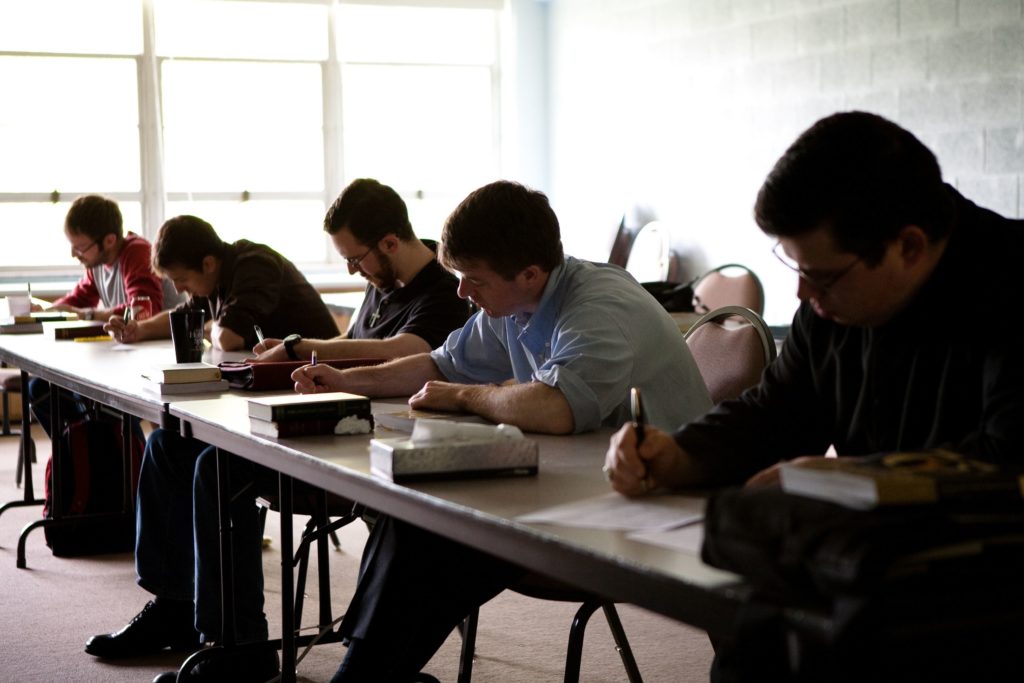
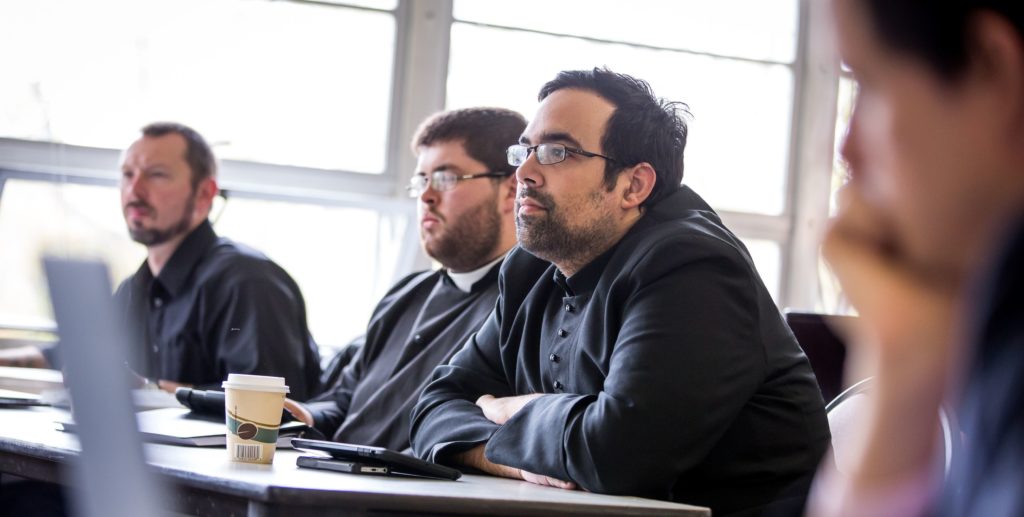
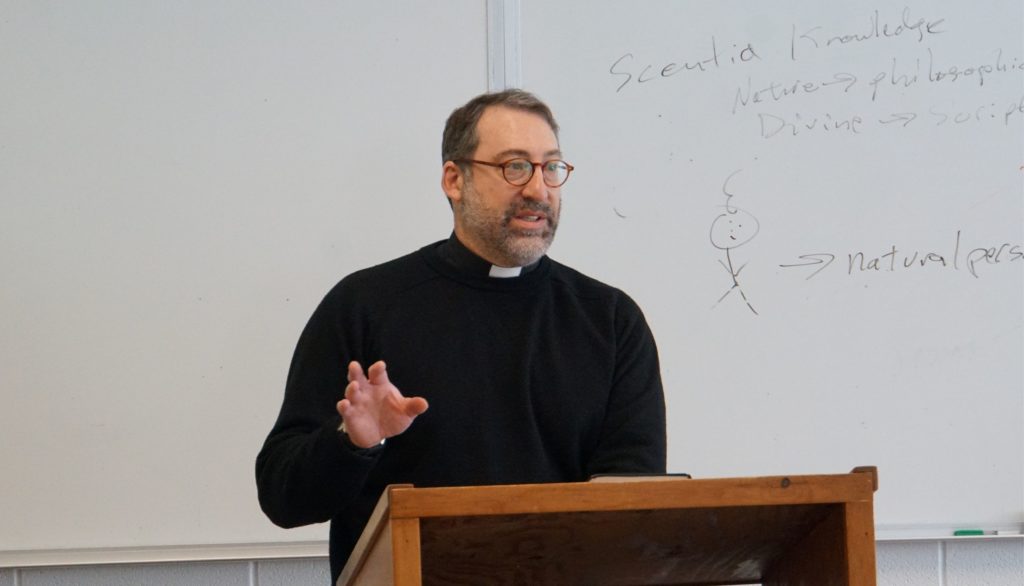
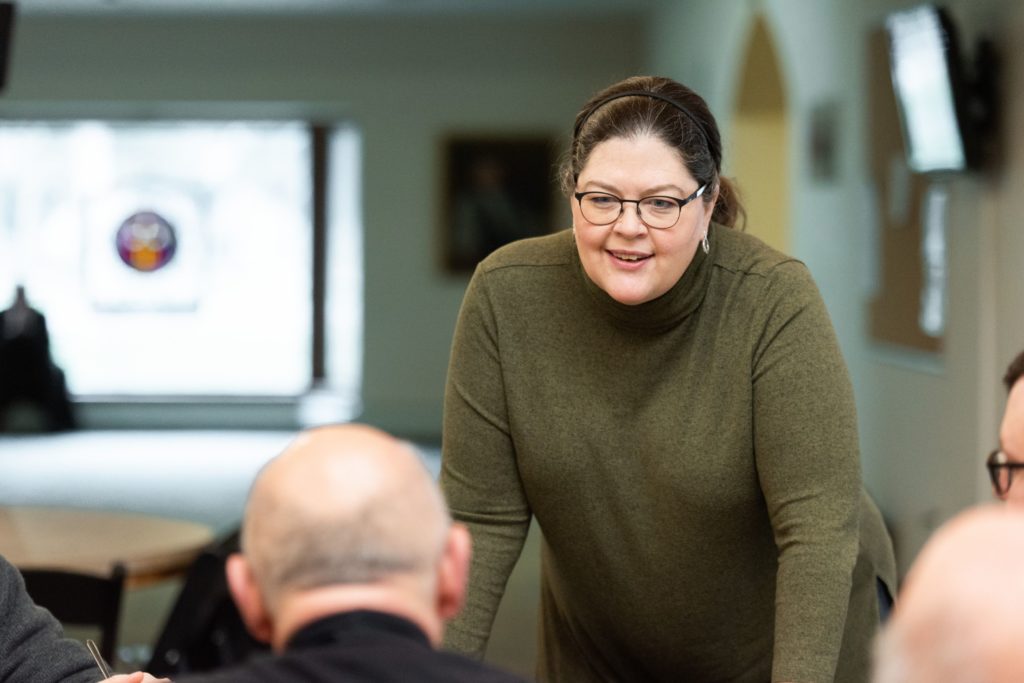
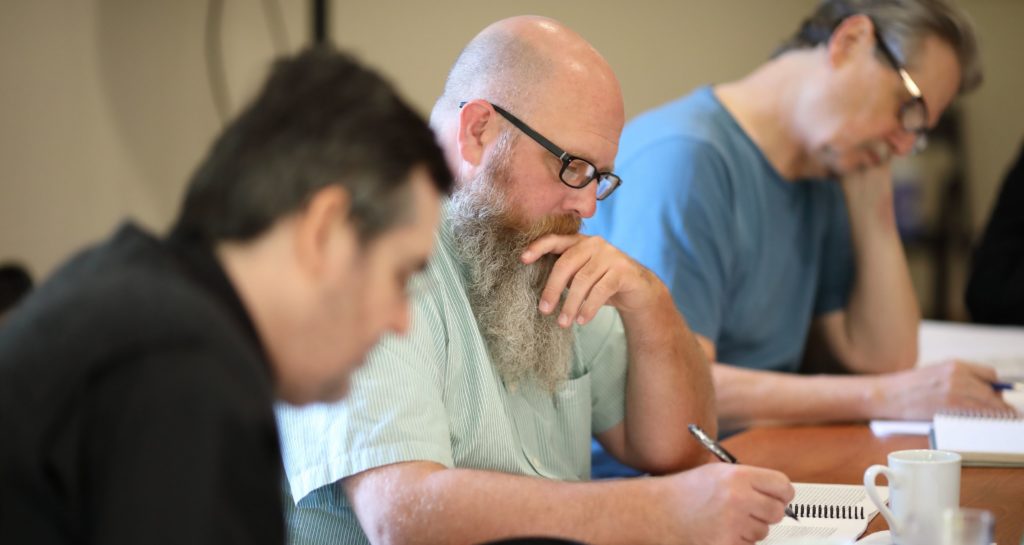
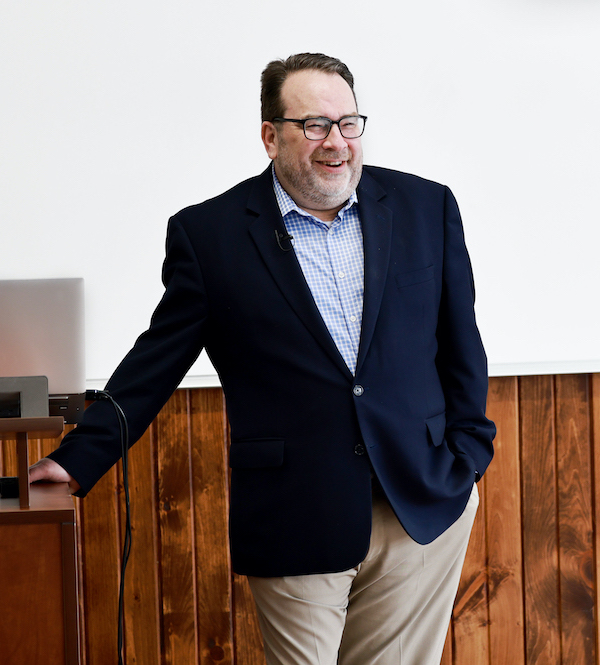
As a seminary student of Nashotah House, you will have the opportunity to live with and learn from accredited, published, and award-winning faculty members who are invested in your formation. Visit our Faculty page to discover more about their publications, expertise, and call to ministry.
Nashotah House Faculty